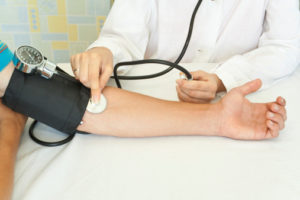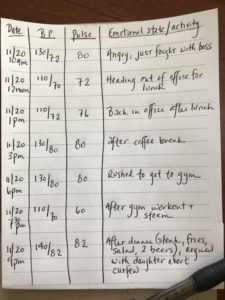In our series, “Medical News: What Can You Believe?”, Dr. Kathryn Hayward and Dr. Bill Manahan explore the whirlwind of news reports that tell us to do things for our health. Many reports point people in the direction of taking medications, which raises red flags like economic incentives and medication side effects. Some people wonder, “What can I do to avoid taking unnecessary medications?”
Part 1 of our series focuses on the new guidelines for high blood pressure, which will abruptly award that diagnosis to millions of people, opening up markets for the five types of blood pressure-lowering medications.
Part 2 is about osteoporosis, and the efforts to convince women that they need particular drugs to maintain bone health.
Part 1: Raising Blood Pressure
By Kathryn Hayward, MD
Recently, the American Heart Association and the American College of Cardiology released new treatment guidelines that sharply lower the threshold for high blood pressure, or hypertension. As a result, millions of Americans who go to the doctor will be told that they have high blood pressure or that more intensive drug treatment is required for their high blood pressure. That news, in itself, may very well raise your blood pressure.
What should you do?
 First, check the accuracy of the in-office diagnosis. Be sure that your blood pressure was taken correctly in the office. Here is the proper arm position: The arm should be completely supported by a table, and be at the level of your heart. The muscles should be relaxed.
First, check the accuracy of the in-office diagnosis. Be sure that your blood pressure was taken correctly in the office. Here is the proper arm position: The arm should be completely supported by a table, and be at the level of your heart. The muscles should be relaxed.
Second, hold off on any change of medications. Unless your doctor tells you that your situation is dire, you have time to gather data. Some people have high blood pressure readings only in the doctor’s office. You deserve to do some investigating before you take medications. Make another appointment with your doctor in two weeks.
Third, purchase a home blood pressure monitor. Be sure the cuff properly fits your upper arm.
 For the next two weeks, take your blood pressure (with proper arm position) several times a day, in a variety of emotional and activity states (when you first awaken, before and after exercise, when you are upset or aggravated, when you are very relaxed, before and after meals) and keep a diary that records:
For the next two weeks, take your blood pressure (with proper arm position) several times a day, in a variety of emotional and activity states (when you first awaken, before and after exercise, when you are upset or aggravated, when you are very relaxed, before and after meals) and keep a diary that records:
- Blood pressure
- Pulse
- Your emotional state and activity
Note on your diary your intake of alcohol, medications and supplements, as they may affect your blood pressure.
Fourth, consider what lifestyle changes you are willing to engage in. Movement, Food and Mind/Body/Spirit Disciplines all help to lower blood pressure without medications. More on this below.
Fifth, keep your two-week appointment with your doctor. Bring your home blood pressure monitor and your diary to the appointment. Check the accuracy of your machine against the office’s machine. Share your diary with your doctor and discuss treatment options.
Here are the five types of blood pressure-lowering medications:
- Diuretics. Side effects: frequent urination, dehydration, dangerously-low sodium levels, impotence and loss of sex drive.
- ACE inhibitors. Side effects: dry cough, dangerously-high blood levels of potassium, dizziness, headache, drowsiness, nausea, vomiting, diarrhea.
- Angiotensin II receptor blockers, or ARBs. Side effects: dangerously-high potassium levels, dizziness, headache, drowsiness, nausea, vomiting, diarrhea, cough.
- Calcium channel blockers. Side effects: headache, impotence and loss of sex drive, constipation, rash, nausea, fatigue, heart rhythm problems, swollen hands.
- Beta Blockers. Side effects: fatigue, cold hands, impotence and loss of sex drive, constipation, diarrhea, dizziness, depression, sleep disturbances.
If you don’t want to risk experiencing these medication side effects, then you may be ready to consider lifestyle changes.
 Food: A whole food, plant-based lifestyle is delicious, supports weight loss, lowers blood pressure, and decreases heart disease and cancer risk.
Food: A whole food, plant-based lifestyle is delicious, supports weight loss, lowers blood pressure, and decreases heart disease and cancer risk.
Movement: Moving the body daily lowers blood pressure.
Mind/Body/Spirit Disciplines: Decrease stress and therefore blood pressure improves.
In other blogs, we offer many specific recommendations that will help you lower blood pressure and stress. Also, you may be interested in coming to our Living Whole immersion retreat in Avila, Spain June 17-22, 2018. Early Bird rates are in effect until January 15.
 Kathryn Hayward, MD co-founded and developed International Integrators because she loves to collaborate with others who share her vision for global integrative health. She brings to International Integrators her experience in the practice of conventional medicine as a primary care internist, and in integrative health, as well as her connection to the natural world. Kathryn marvels at the power of collective, conscious action on the part of like-minded individuals to manifest change, and loves contributing to that action.
Kathryn Hayward, MD co-founded and developed International Integrators because she loves to collaborate with others who share her vision for global integrative health. She brings to International Integrators her experience in the practice of conventional medicine as a primary care internist, and in integrative health, as well as her connection to the natural world. Kathryn marvels at the power of collective, conscious action on the part of like-minded individuals to manifest change, and loves contributing to that action.



Hi Kath and Dave,
Very interesting.
DL
Excellent advice and ideas, Kathryn. Thank you.